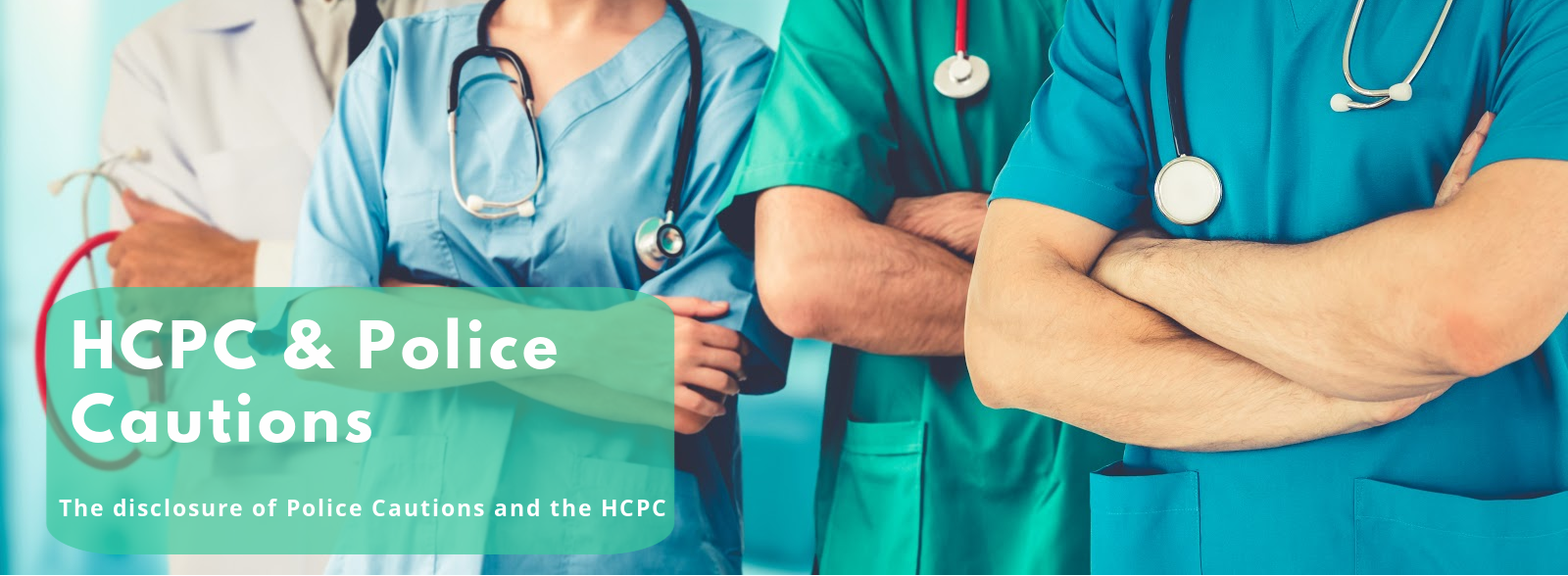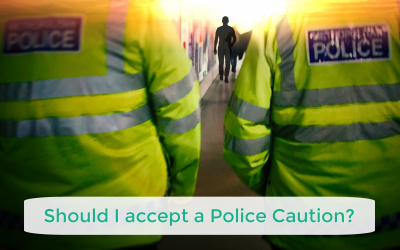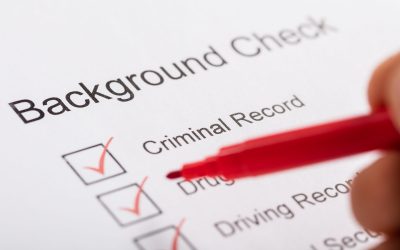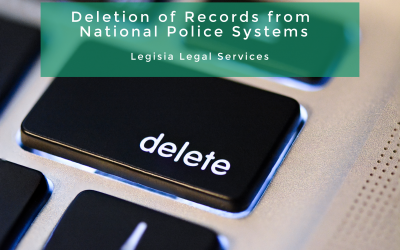The HCPC and Police Cautions
If you have received a police caution, and you are currently regulated by the Health and Care Professions Council (HCPC), or you hope to be, then you will need to consider the HCPC’s rules on the disclosure of criminal records.

The HCPC and Police Cautions
The HCPC and Police Cautions
If you have received a police caution, and you are currently regulated by the HCPC, or you hope to be, then you will need to consider the HCPC’s rules on the disclosure of criminal records.
Who does the HCPC regulate?
The HCPC regulates a wide variety of healthcare professionals, these include the following:
- Speech and language therapists
- Radiographers
- Prosthetists/Orthotists
- Practitioner psychologists
- Physiotherapists
- Paramedics
- Orthoptists
- Operating department practitioners
- Art therapists
- Biomedical scientists
- Chiropodists/Podiatrists
- Clinical scientists
- Dietitians
- Hearing aid dispensers
- Occupational therapists
Do all cautions need to be disclosed to the HCPC?
The answer to this question is yes, generally speaking, but there are some exceptions.
If you have received a police caution, and you are currently regulated by the HCPC, you in all circumstances need to disclose the police caution to the HCPC straight away/as soon as reasonably possible. You must “self-refer” yourself to the HCPC if you received either a simple police caution or a conditional caution.
Should I disclose my Caution to the HCPC if I plan on appealing it?
Even if you dispute the basis of the caution, you must not delay in reporting it to the HCPC. If the caution is ultimately overturned this can be communicated to the HCPC, and it is likely that any investigation, or decision will be halted/overturned, but the HCPC will see it as being dishonest if you fail to disclose a caution on the basis that it is under appeal.
Even if you have a good case to argue for the deletion of your caution, on a practical level it may not be possible to resolve your case promptly, or you simply may not be able to persuade the police/the High Court that your caution was wrongly issued. In the meantime you may be asked by your employer to undertake a DBS check which would reveal the caution, and which could trigger a referral to the HCPC by your employer/the DBS. If you are referred, not having revealed the caution yourself, this will be seen very negatively by the HCPC. The police also have a “common law disclosure” power to provide information to regulators and so they may inform the HCPC about your police caution directly – most often the police will tell you before making a common law disclosure.
When might I not need to disclose a police caution to the HCPC?
All recently received cautions will need to be disclosed, so if you are currently an HCPC regulated person, and you receive a caution, you will need to disclose it.
If however your caution is older, and you are looking to register with the HCPC, you will not need to disclose your police caution if it was issued 6 or more years ago. The only exception to this is if your caution was issued for a more serous offence. If your caution was issued for a more serious offence then your caution will never become “protected”, and so will never be filtered from a standard and enhanced DBS check, and will always need to be disclosed. The DBS keeps a list of offences on their website that never become filtered.
What will happen when I disclose my police caution to the HCPC?
In cases where someone is applying to register with the HCPC, or where they are already registered and have recently received a police caution, the HCPC will look at the individual facts of the case.
The HCPC will need to assess whether each applicant’s or registrant’s fitness to practice is impaired by the facts of the caution.
In considering the nature, circumstances and gravity of an offence, the HCPC will take account of its role in the protection of the public in its broadest sense, including whether the registrant’s actions bring the profession concerned into disrepute or may undermine public confidence in that profession – this can include incidents that have occurred entirely outside of a working context, such a domestic assault caution, or a caution relating to an allegation of child neglect or cruelty at home.
Once the matter is referred to the HCPC, and it is determined that the matter is within the HCPC’s remit (if you have received a police caution and you are regulated by the HCPC, then your case will be within the HCPC’s remit) an investigation will be opened by a case manager.
The case manager will gather the evidence together and then apply the “threshold test” to see whether it should proceed to an Investigating Committee Panel. You will be given an opportunity to provide representations to the Panel before they take their decision.
The Investigating Committee Panel of the HCPC does not decide whether allegations are proven, they only decide whether there is a “realistic prospect” of proving the facts of an allegation at a final hearing. If they do find there is a real prospect, then the matter will move to final hearing where sanctions, including striking off, can be imposed.
If the HCPC’s Investigating Committee Panel find that there is no case to answer, the panel can issue “learning points” to a registrant, this would often happen where the Panel feels there is a realistic prospect of proving the facts of an allegation, but not of establishing impairment.
The HCPC’s role is not to punish, but to ensure that the public is protected from practitioners who are impaired, so even where a police caution has been issued, if sufficient insight and reassurances can be demonstrated, and where the offence is not grave, it will be possible to persuade the panel that there is no realistic prospect of establishing current impairment.
HCPC and Police Caution Lawyers
If you have been referred to the HCPC due to a police caution or other criminal investigation or allegation, then please get in touch.
We are expert lawyers dealing with all matters related to criminal records and disciplinary proceedings.
In addition we have extensive experience in challenging disclosures on enhanced DBS certificates, DBS barring proceedings, and also applications to delete police records, including deleting police cautions. We have successfully applied for the deletion of many police cautions, and where they have related to disciplinary cases, the deletion has resulted in disciplinary proceedings being brought to a positive end.
We offer reasonable fixed fees, and will provide you an honest and frank advice on your prospects of success.
Contact Us
Related Articles
Related
Can Local Police Records be Deleted?
In the recent High Court judgment of AB v Chief Constable of British Transport Police [2022] the court ordered the deletion of locally retained police records.Can Local Police Records be Deleted?Can Local Police Records be Deleted?In the recent High Court judgment of...
Should I Accept a Police Caution?
Should I accept a police caution? We are often asked by clients whether they should accept a police caution.Should I accept a police caution?Should I accept a police caution?We are often asked by clients whether they should accept a police caution. Whether to accept a...
Police Caution Removal Solicitor
If you have received a police caution, we are experts in police caution removal.Police Caution Removal SolicitorPolice Caution Removal SolicitorIf you have received a police caution, we are experts in police caution removal. We are a dedicated legal practice focusing...
Can Local Police Records be Deleted?
In the recent High Court judgment of AB v Chief Constable of British Transport Police [2022] the court ordered the deletion of locally retained police records.Can Local Police Records be Deleted?Can Local Police Records be Deleted?In the recent High Court judgment of...
Should I Accept a Police Caution?
Should I accept a police caution? We are often asked by clients whether they should accept a police caution.Should I accept a police caution?Should I accept a police caution?We are often asked by clients whether they should accept a police caution. Whether to accept a...
Police Caution Removal Solicitor
If you have received a police caution, we are experts in police caution removal.Police Caution Removal SolicitorPolice Caution Removal SolicitorIf you have received a police caution, we are experts in police caution removal. We are a dedicated legal practice focusing...
Deletion of Records from National Police Systems
It is possible to apply for the deletion of your records from National Police Systems, namely the Police National Computer (PNC), the National DNA Database (NDNAD) and also the National Fingerprint Database (IDENT1).Deletion of Records from National Police...

Head Office
Legisia Legal Services
The North Colchester Business Centre
340 The Crescent
Colchester
Essex, CO4 9AD
Cases are conducted nationwide & internationally
Additional consultation Address (Not Postal)
50 Liverpool Street
London EC2M 7PY




